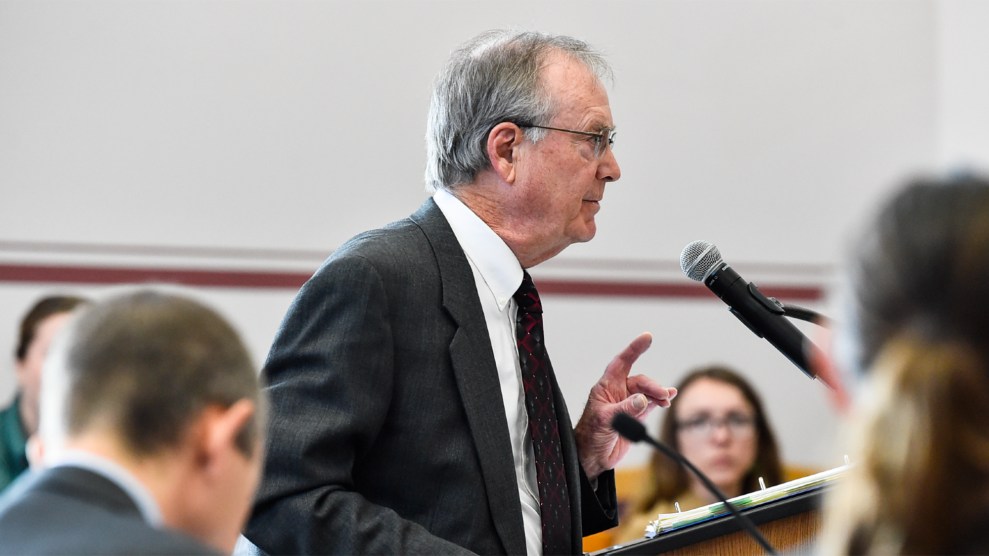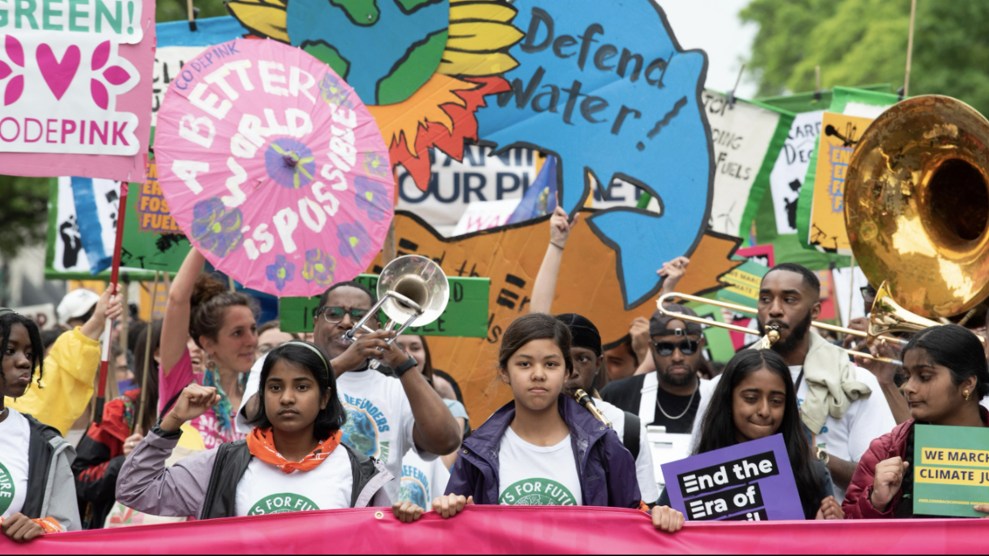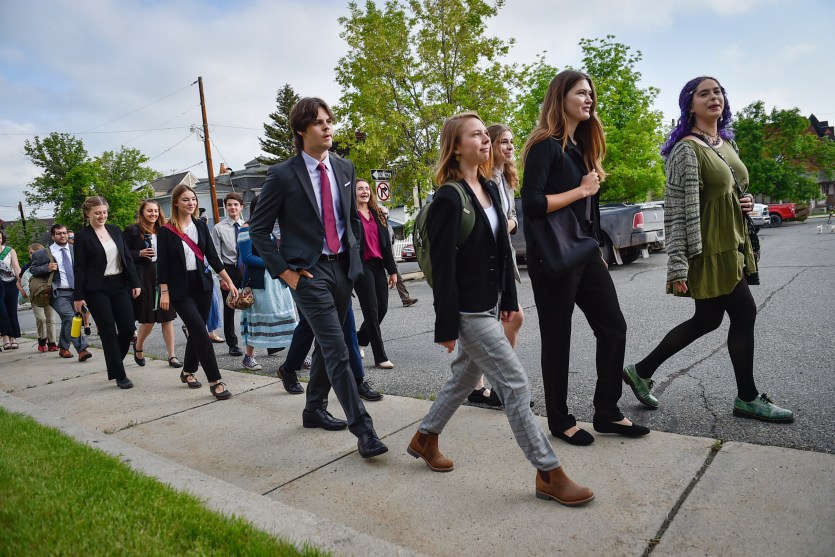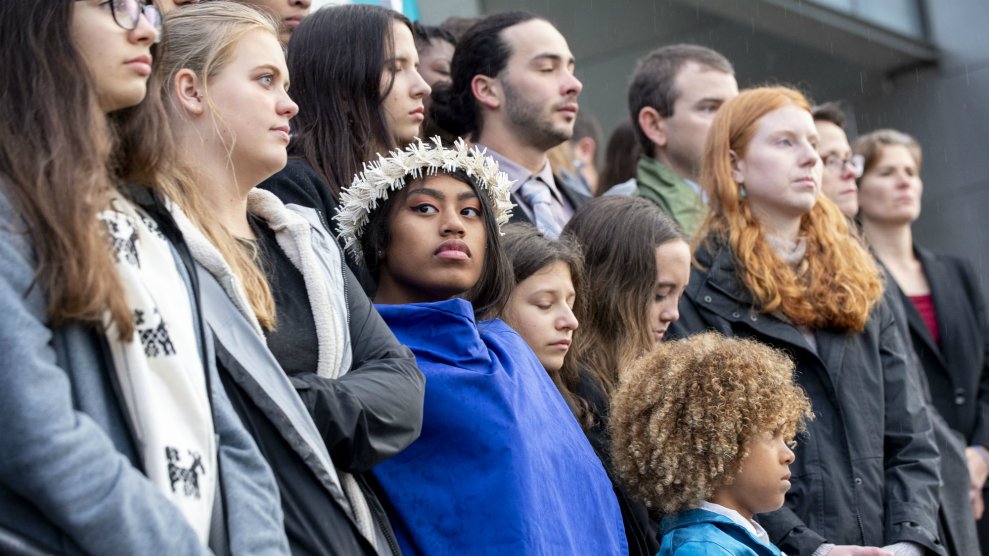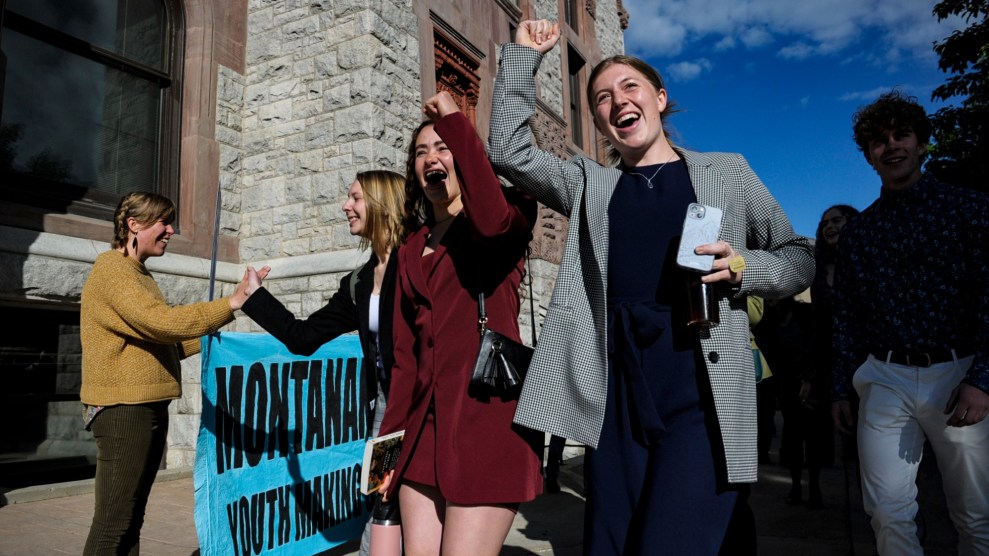
Youth plaintiffs in the climate change lawsuit, Held vs. Montana, arrive at the Lewis and Clark County Courthouse, on June 20, 2023, in Helena, Mont., for the final day of the trial.Thom Bridge/AP
A healthy climate is included in your constitutional rights, at least if you live in Montana. On Monday, District Court Judge Kathy Seeley sided with the 16 young plaintiffs who sued Montana three years ago, arguing that its pro–fossil fuels legislation violated their right to a safe environment. Seeley ruled in the case, Held v. Montana, that “plaintiffs have a fundamental constitutional right to a clean and healthful environment, which includes climate as part of the environmental life support system.” She continued that “Montana’s emissions and climate change have been proven to be a substantial factor in causing climate impacts to Montana’s environment and harm and injury.” The case was only the third climate-related lawsuit ever to go to trial, and the first to focus on a state’s constitution.
And with Seeley’s ruling, Held v. Montana became the first ever lawsuit to link climate change to the constitutional right to a healthy environment. The magnitude of this ruling cannot be overstated. “I think this is the strongest decision on climate change ever issued by any court,” Michael Gerrard, the founder and faculty director of the Sabin Center for Climate Change Law at Columbia University, told me this morning.
The plaintiffs, all of whom were minors at the time the suit was filed, certainly agree. Kian, one of the young people to sue, wrote in a statement: “This ruling, this case; it is truly historic. We are heard! Frankly the elation and joy in my heart is overwhelming in the best way. We set the precedent not only for the United States, but for the world.” Another plaintiff, Eva, summed it up with, “I’m so speechless right now…I cannot believe the ruling. I’m just so relieved.”
Seeley’s ruling does not bar the use of fossil fuels in the state, but it does limit legislation that has made Montana a fossil fuel haven. Gerrard explains: “The court found that renewables (wind, solar, hydro) can economically substitute for fossil fuels…and that the state law barring consideration of climate in impact assessment is unconstitutional.” Seeley also charged the legislature with protecting the climate, although it remains to be seen how the Republican supermajority will tackle the task.
The ruling comes after a rare and rigorous examination of the science. “After a trial where climate scientists testified under oath and were subject to cross examination (very rare in itself),” explains Gerrard, “the court issued a 103-page decision that found that fossil fuel use is the principal cause of climate change, which is in turn causing serious health and environmental impacts that will continue to get worse.”
The Montana Attorney General’s office is already planning to file an appeal, spokeswoman Emily Flower says. Flower also called the trial a “weeklong taxpayer-funded publicity stunt” and Seeley “an ideological judge who bent over backward to allow the case to move forward and earn herself a spot in their next documentary.”
The stakes of the ruling were high. Prior to the ruling, Gerrard explained that while it “would not set a binding precedent…it could embolden other judges to move in similar directions.” The case essentially tested whether a clause in Montana’s constitution protecting the right to “a clean and healthful environment” extends to climate change. Several other states—including Hawaii, Illinois, Massachusetts, Montana, Pennsylvania, and Rhode Island—and more than 100 countries have similar constitutional clauses. “This ruling may inspire similar lawsuits around the world,” Gerrard said today.
The plaintiffs’ attorneys, including those at Our Children’s Trust who also represent youth in several upcoming climate trials, see this as a huge step in the positive direction. “As fires rage in the West, fueled by fossil fuel pollution, today’s ruling in Montana is a game-changer that marks a turning point in this generation’s efforts to save the planet from the devastating effects of human-caused climate chaos.” said the chief legal counsel and executive director of Our Children’s Trust in a statement, “This is a huge win for Montana, for youth, for democracy, and for our climate. More rulings like this will certainly come.”
Gerrard also pointed out what worked effectively about the trial. “The plaintiffs’ lawyers very effectively put on the stand several young Montana residents who testified how they were personally affected negatively by climate change” he said. “Putting a human face on this global problem worked well in this courtroom, and may well be followed elsewhere.”
The next time we will see youth on the stand will be in Hawaii in September 2024, where they will argue that Hawaii Department of Transportation’s high levels of greenhouse gas emissions violates their state constitutional rights. The lawsuit is especially notable as Hawaii faces devastating wildfires exasperated by climate change.

